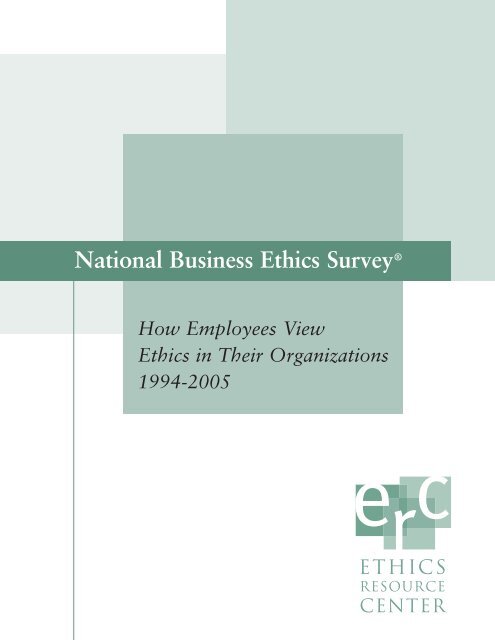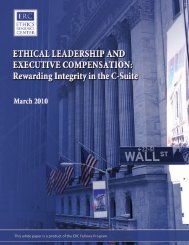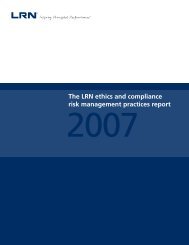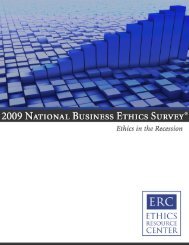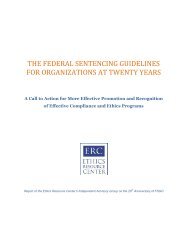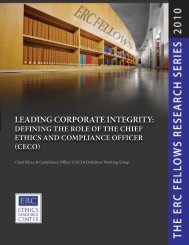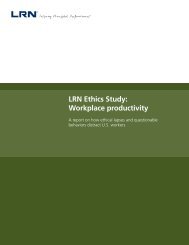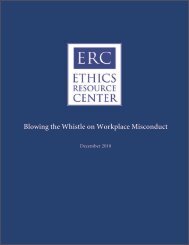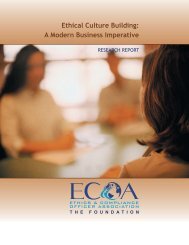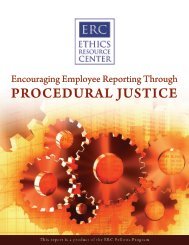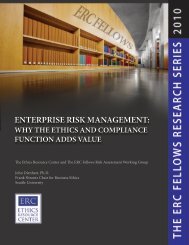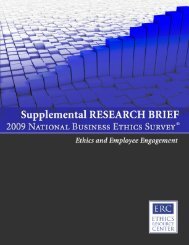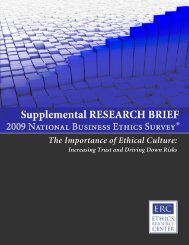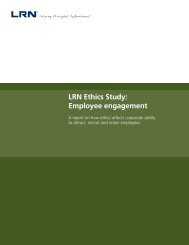(AA)-NBES FINAL-2005 - Ethics Resource Center
(AA)-NBES FINAL-2005 - Ethics Resource Center
(AA)-NBES FINAL-2005 - Ethics Resource Center
Create successful ePaper yourself
Turn your PDF publications into a flip-book with our unique Google optimized e-Paper software.
National Business <strong>Ethics</strong> Survey ®<br />
How Employees View<br />
<strong>Ethics</strong> in Their Organizations<br />
1994-<strong>2005</strong>
Executive Summary<br />
The nation’s oldest nonprofit in<br />
organizational ethics presents<br />
findings from the longest study<br />
of ethics and compliance in the<br />
workplace.<br />
Since 1994 the <strong>Ethics</strong> <strong>Resource</strong> <strong>Center</strong> (ERC) has implemented<br />
the National Business <strong>Ethics</strong> Survey (<strong>NBES</strong>), a<br />
study of employees across for-profit, nonprofit and<br />
governmental sectors in the United States. The <strong>2005</strong> report<br />
marks the fourth implementation of the research.<br />
Research Content<br />
The <strong>NBES</strong> survey asks employees about their perceptions of<br />
ethics and compliance at work. Analysis was based upon a<br />
framework provided by Federal Sentencing Guidelines for<br />
organizations (FSGO), defining elements of formal programs,<br />
ethical culture, risk and outcomes expected of an<br />
effective program. Findings address:<br />
• Trends in the implementation of formal ethics and compliance<br />
programs;<br />
• Evidence of ethical culture in organizations;<br />
• Analysis of risk for misconduct;<br />
• Measures of outcomes expected from effective<br />
programs; and<br />
• Analysis of the impact of formal program elements<br />
and ethical culture on outcomes.<br />
Key Findings<br />
Some of the findings and conclusions of <strong>NBES</strong> are as<br />
follows.<br />
• On a national level, formal programs are on the rise, but<br />
positive outcomes expected of those programs are not.<br />
• Formal ethics and compliance programs do have an<br />
impact, but organizational culture, which has changed<br />
little over the years of the <strong>NBES</strong> study, is more influential<br />
in determining outcomes.<br />
• Employees are at risk for misconduct, and where they<br />
encounter situations inviting wrongdoing, there is high<br />
likelihood that they will also observe at least 1 violation<br />
taking place.<br />
These findings are further highlighted in the sections<br />
that follow.<br />
Rise in Formal Program Implementation<br />
Increasing numbers of employees recognize the presence<br />
of formal ethics and compliance programs in their organizations.<br />
Five of the six elements of a formal program measured<br />
by <strong>NBES</strong> rose during the years in which questions<br />
were asked about these elements:<br />
• Written standards of conduct (up 19 percentage<br />
points 1 since 1994);<br />
• Training on ethics (up 32 percentage points since 1994);<br />
• Mechanisms to seek ethics advice or information (up 15<br />
percentage points since 2000);<br />
• Means to report misconduct anonymously (up 7 percentage<br />
points since 2003);<br />
• Discipline of employees who violate ethical standards (up<br />
4 percentage points since 2003).<br />
Only one element of a formal program has not increased:<br />
the evaluation of employee performance based on ethical<br />
conduct decreased by 7 percentage points since 2003.<br />
Outcomes Remain Unchanged or Worsened<br />
Despite the rise in formal program activity, positive outcomes<br />
expected from effective programs either remain unchanged<br />
or show a decline. These include observed misconduct,<br />
reporting behaviors, and pressure to compromise standards.<br />
52% of employees observed at least<br />
one type of misconduct in the past year.<br />
Little Change in Levels of Observed Misconduct<br />
Little change has taken place since 1994 in the extent to<br />
which employees observe misconduct in the workplace.<br />
Remarkably, in <strong>2005</strong> 52% of employees observed at least<br />
one type of misconduct taking place; 36% of those employees<br />
observed 2 or more violations. 2<br />
Employee Willingness to Report Misconduct<br />
Declined in <strong>2005</strong><br />
Of the employees who observed misconduct at work in<br />
<strong>2005</strong>, just over one half (55%) reported it to management,<br />
a 10 percentage point decrease since 2003 and a backsliding<br />
to levels similar to those in 2000. 3<br />
1<br />
Percentage points refers to the difference between two percentages. For<br />
example, in 1994 67% of employees said their organizations had written<br />
standards. In <strong>2005</strong>, 86% indicated as such, resulting in a<br />
difference of 19 percentage points.<br />
2<br />
Two measures of misconduct are collected in <strong>NBES</strong>. Increases<br />
over time reported here are drawn from a comparison of questions asking<br />
employees outright if they have observed misconduct. Levels of<br />
observed misconduct are drawn from an analysis of employee observation<br />
of specific forms of violations.<br />
3<br />
Based upon general question about misconduct (see footnote #1)
Executive Summary<br />
Little Change in Pressure to Compromise<br />
Standards<br />
Pressure to compromise standards has also remained<br />
unchanged. In <strong>2005</strong>, 10% of employees feel such pressure<br />
always or fairly often, a level similar to 2003 and down 3<br />
percentage points since 2000.<br />
55% of employees who observed<br />
misconduct reported it.<br />
Formal Programs Make a Difference in<br />
Weaker Ethical Cultures<br />
The fact that formal programs are increasing while outcomes<br />
are at best unchanged raises the question whether<br />
ethics programs work. <strong>NBES</strong> revealed that ethics and compliance<br />
programs do make a difference; however, their<br />
impact depends upon the culture in which they are implemented.<br />
Our key findings are:<br />
1. The more formal program elements the better;<br />
2. Formal programs do have some impact on outcomes in<br />
weak cultures;<br />
3. Once a strong culture is in place, formal programs do not<br />
have much of an impact on outcomes.<br />
Outcomes are best in cultures that are strong, defined in<br />
<strong>NBES</strong> as the display of certain ethics-related actions at various<br />
levels in an organization, and accountability for actions.<br />
Ethical Culture Matters<br />
<strong>NBES</strong> measured 18 dimensions of ethical culture, and the<br />
data show that the actions of leaders and peers significantly<br />
influence employees’ ethics. For example:<br />
• Where top management displays certain ethics-related<br />
actions, employees are 50 percentage points less likely to<br />
observe misconduct.<br />
• <strong>Ethics</strong>-related actions of coworkers can increase employee<br />
willingness to report misconduct, by as much as 10<br />
percentage points.<br />
• When employees perceive that others are held accountable<br />
for their actions, their overall satisfaction increases<br />
by 32 percentage points.<br />
Furthermore, employees in organizations with strong ethical<br />
cultures and full formal programs are 36 percentage points<br />
less likely to observe misconduct than employees in organizations<br />
with weak culture and full formal programs.<br />
Importantly, less than 1% employees in strong cultures did<br />
not have any elements of a formal program present, and<br />
<strong>NBES</strong> did reveal a relationship between formal programs and<br />
cultures. Therefore it is our initial conclusion, subject to further<br />
study, that where cultures are strong, it is in part because<br />
a formal program is in place. Even further, formal programs<br />
are likely to be an essential element in the maintenance of a<br />
strong culture. While culture matters in making an impact,<br />
formal programs are still essential to creating a culture.<br />
Growing attention to ethics and compliance must, therefore,<br />
be supplemented by attention to culture. In <strong>2005</strong>,<br />
none of the elements of ethical culture (as measured in this<br />
study) increased substantially over past years. This may be<br />
one reason that outcomes have remained unchanged.<br />
Employees Are At Risk for Misconduct<br />
When employees are exposed to risk-related situations, they<br />
are highly likely to observe actual misconduct taking place.<br />
One-third of all employees encounter a situation at work that<br />
they think invites ethical misconduct. Of those people, 74%<br />
also observed at least one act of misconduct. Among employees<br />
who feel pressured to compromise the standards of their<br />
organizations, 94% observed at least one type of misconduct.<br />
Outcomes are best in<br />
cultures that are strong.<br />
Additional Findings in the <strong>NBES</strong><br />
Report<br />
<strong>NBES</strong> <strong>2005</strong> provides additional findings regarding outcomes,<br />
formal programs, risk, ethical culture and measurement<br />
of impact. Sector, management level, multinational<br />
status, and other key indicators driving change are detailed.<br />
For example, the report includes information about:<br />
• Employees most likely to observe misconduct;<br />
• Factors in the decision to report misconduct;<br />
• The usefulness of ethics training; and<br />
• The impact of various levels of management on the ethical<br />
conduct of employees.<br />
About the <strong>Ethics</strong> <strong>Resource</strong> <strong>Center</strong><br />
The <strong>Ethics</strong> <strong>Resource</strong> <strong>Center</strong> (ERC) is the nation’s oldest nonprofit<br />
devoted to organizational ethics. We advance understanding<br />
of the practices that promote ethical conduct by conducting<br />
research and by developing whitepapers and resources<br />
based on our findings. ERC also conducts evaluations of<br />
ethics and compliance program effectiveness, and provides<br />
data for benchmarking the impact of program elements.<br />
For More Information<br />
To order a copy of the <strong>NBES</strong> report or to learn more about<br />
the activities of the <strong>Ethics</strong> <strong>Resource</strong> <strong>Center</strong>, please contact<br />
us at 202-737-2227, ethics@ethics.org or visit our website<br />
at www.ethics.org.
Primary Sponsors:


